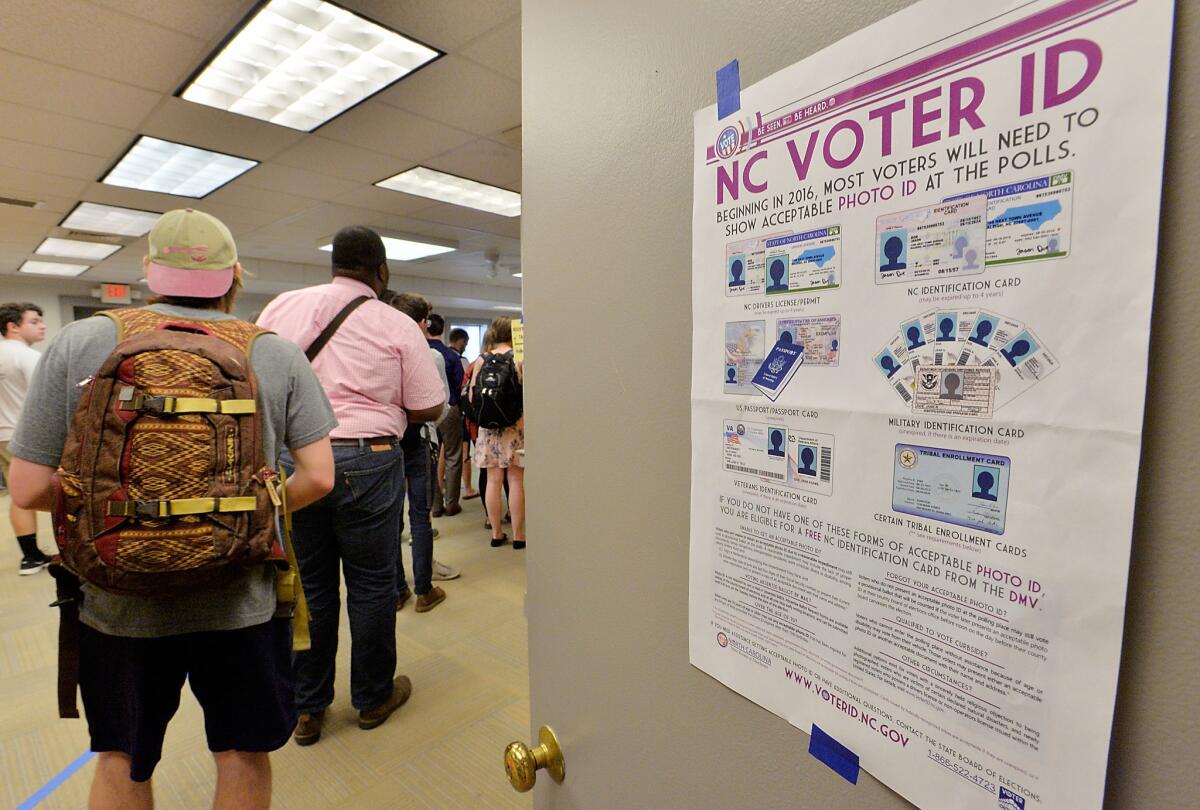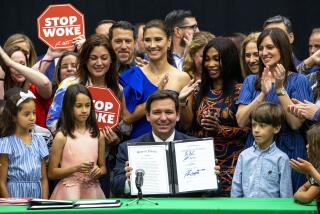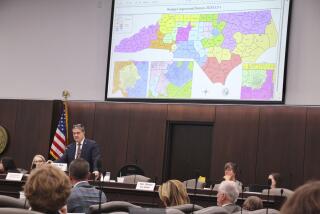Court ruling against North Carolina voter ID law could help Hillary Clinton

Three years after the Supreme Court deemed a key anti-discrimination provision of the Voting Rights Act unnecessary, a federal court on Friday ruled that a subsequently imposed North Carolina law requiring photo IDs at polling places was aimed at discouraging minority turnout.
The decision, just three months before election day, likely gives Democrat Hillary Clinton’s presidential campaign a boost by removing potential voting barriers that would have fallen hardest on African Americans and other Democratic-leaning voters.
The strongly worded decision by a three-judge panel of the 4th Circuit U.S. Court of Appeals in Richmond, Va., blasted the Republican-led state Legislature, all but charging lawmakers with racism in passing a law that also curtailed voting times.
“Because of race, the legislature enacted one of the largest restrictions of the franchise in modern North Carolina history,” Judge Diana Gribbon Motz wrote for the panel, all Democratic appointees. “We can only conclude that the North Carolina General Assembly enacted the challenged provisions of the law with discriminatory intent.”
The decision, which reverses a lower court ruling, is a major victory for the state’s NAACP chapter, the Obama administration and others who sued to overturn the law.
And it marked the third time in 10 days that a federal court concluded a voter identification law enacted by a Republican-led state government threatened voting rights.
Last week, the 5th Circuit U.S. Court of Appeals in New Orleans ordered Texas state officials to take steps to help minority voters disproportionately affected by that state’s voter identification requirement.
And in Wisconsin, a federal judge effectively prohibited that state from requiring voters to have photo identification when they vote.
Civil rights groups say such laws put an undue burden on poor and minority voters, who may not have valid photo IDs or would encounter difficulties obtaining one. Such voters also tend to vote for Democrats, leading critics to allege the laws are intended to help Republican candidates.
“The timing of these decisions really speaks to the way in which courts are awakening to the fact that race is unfortunately influencing many legislatures that are crafting impediments to voting,” said Ryan Haygood, a former voting rights lawyer for the Legal Defense Fund of the NAACP. “Now that the burden has been lifted, I think we can expect more turnout.”
That may prove particularly critical in North Carolina, which emerged as a swing state after record numbers of African American voters helped Barack Obama carry it in 2008. North Carolina had not backed a Democratic presidential candidate since 1976.
The Clinton campaign has been targeting North Carolina, and Obama campaigned there alongside Clinton earlier this month, the first time the two had appeared together on the stump.
North Carolina also may play a key role this year in the battle for control of the U.S. Senate. Democrats, hoping to regain a majority, are eyeing Republican Sen. Richard Burr’s seat.
On Friday, North Carolina Republican leaders blasted the court’s decision. “Three Democratic judges are undermining the integrity of our elections while also maligning our state,” Gov. Pat McCrory said in a statement. He pledged to appeal the decision, though it is unclear whether the Supreme Court would act before the Nov. 8 election.
North Carolina and other Republican-led states, including many in the South, enacted new voter identification laws almost immediately after the Supreme Court in 2013 struck down Section 5 of the Voting Rights Act, which had required states and municipalities with a history of discrimination to seek clearance from the federal government before changing voting rules.
Although the Constitution was amended after the Civil War to forbid racial discrimination in voting, that protection had proved ineffective in the face of Southern lawmakers determined to enact rules to limit voting access.
But Chief Justice John G. Roberts Jr., a longtime critic of the preclearance requirement, wrote in the court’s 5-4 decision that the special scrutiny for the South was outdated, brushing aside pleas from civil rights advocates who warned that the protections were still necessary.
North Carolina responded by cutting back early voting, ending same-day registration and requiring voters to present photo identification before casting a ballot.
Like the architects of similar laws around the country, North Carolina lawmakers argued the steps were necessary to prevent voter fraud.
In its blistering decision Friday, the appellate court firmly rejected that reasoning, charging that the state had devised “cures for problems that did not exist.”
Instead, the judges concluded, the legislature embarked on an obviously partisan effort to solidify Republican control of state government by targeting black voters “with almost surgical precision” and undermining a key Democratic voting bloc.
“We recognize that elections have consequences, but winning an election does not empower anyone in any party to engage in purposeful racial discrimination,” Motz wrote.
“When a legislature dominated by one party has dismantled barriers to African American access to the franchise, even if done to gain votes, ‘politics as usual’ does not allow a legislature dominated by the other party to re-erect those barriers. The record evidence is clear that this is exactly what was done here.”
The court’s decision was cheered by voting rights activists, including the American Civil Liberties Union, which had joined the challenge.
“This ruling is a stinging rebuke of the state’s attempt to undermine African American voter participation, which had surged over the last decade,” said Dale Ho, director of the ACLU’s Voting Rights Project. “It is a major victory for North Carolina voters and for voting rights.”
U.S. Atty. Gen. Loretta E. Lynch also hailed the decision to invalidate the North Carolina rules, which she said “sent a message that contradicted some of the most basic principles of our democracy.”
Rick Hasen, a law professor and election expert at the UC Irvine School of Law, called the ruling a “big win” for the plaintiffs.
Writing in a blog post, Hasen cautioned that the ruling was not a complete victory, however, because the court declined to restore federal oversight of North Carolina’s voting rules and laws.
Times staff writer Del Quentin Wilber in Washington contributed to this report.
ALSO
6 more Michigan public workers charged in Flint water crisis
Trials of police officers in Freddie Gray case cost Baltimore $7.4 million
Hold that blueberry pie; the Oregon state fair is now judging best marijuana
UPDATES:
2:20 p.m.: This article was updated throughout with staff reporting.
This article was originally published at 10:10 a.m.
More to Read
Start your day right
Sign up for Essential California for news, features and recommendations from the L.A. Times and beyond in your inbox six days a week.
You may occasionally receive promotional content from the Los Angeles Times.






